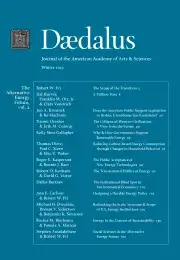The Institutional Blind Spot in Environmental Economics
Economic approaches are expected to achieve environmental goals at less cost than traditional regulations, but they have yet to find widespread application. One reason is the way these tools interact with existing institutions. The federalist nature of governmental authority assigns to subnational governments much of the implementation of environmental policy and primary authority for planning the infrastructure that affects environmental outcomes. The federalist structure also interacts with the choice of economic instruments; a national emissions cap erodes the additionality of actions by subnational governments. Even the flagship application of sulfur dioxide emissions trading has been outperformed by the venerable Clean Air Act, and greenhouse gas emissions in the United States are on course to be less than they would have been if Congress had frozen emissions with a cap in 2009. The widespread application of economic tools requires a stronger political theory of how they interact with governing institutions.
At least among economists, one often-heard lament is that those who develop and implement environmental policy rarely follow economic advice.1 Economics also has something to say about the efficient stringency of environmental policy, but most economists readily appreciate that efficiency, such as it is measured, is just one among many criteria to be considered. However, after a policy goal is established, economists typically feel confident that economic approaches to environmental policy can help achieve the goal at less cost, which should be good for everyone.
Why then are economic methods not the central tools for implementation of environmental policy? One reason may be that these tools have been developed in an intellectual laboratory that, for the most part, is free from consideration of institutions that influence how they will be used. These institutions include the agencies that implement regulations, the broader legal structure of business and government, and existing regulations. Economic authors sometimes argue that sweeping away existing prescriptive standards in favor of economic tools would yield more cost-effective results, which is possible. Many other interested parties believe that confidence in this outcome requires full consideration of the broader institutional setting. Economic methods may not work exactly as anticipated, in part perhaps because institutional influences are not addressed in most economic writing. To resolve this issue, economic discourse must incorporate a more sophisticated understanding of institutions (broadly defined) than is usually achieved.
. . .
